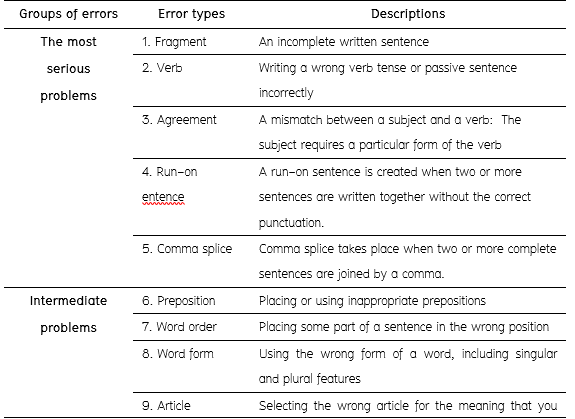Investigation of grammatical errors committed by Turkmen learners of English
Keywords:
English as a foreign language, grammatical errors, Turkmen learners of EnglishAbstract
The domination of English as a global language has penetrated every corner of the world and that includes a Central Asian country, Turkmenistan. English has replaced Russian and is currently a compulsory language for the Turkmens. However, little has been known of Turkmen learners’ English proficiency. This study was therefore conducted to investigate such issues by analysing paragraphs written by 17 participants and identifying their grammatical errors. The theoretical framework for the analysis is adapted from Byrd and Benson (1994) who divided grammatical errors into three stages with 12 sub-categories. The results demonstrate that the highest number of errors occurred in the second stage (intermediate problems), which are mainly related to word-level errors. It is however worth noting that the number of errors does not necessarily correspond with the severity of errors. Arguably, these grammatical errors of Turkmen English learners may be caused by their native language interference.
References
Abushihab, I. (2014). An analysis of grammatical errors in writing made by Turkish learners of English as a foreign language. International Journal of Linguistics, 6(4), 213-223.
Brown, H. D. (1994). Principles of language learning and teaching. Upper Saddle River, NJ: Pearson.
Byrd, P., & Benson, B. (1994). Problem/solution: A reference for ESL writers. Boston, MA: Heinle& Heinle.
Chang, C. B. (2012). Rapid and multifaceted effects of second-language learning on first-language speech production. Journal of phonetics, 40(2), 249-268.
Corder, S. P. (1967). The significance of learner's errors. IRAL-International Review of Applied Linguistics in Language Teaching, 5(1-4), 161-170.
Corder, S. P. (1971). Idiosyncratic dialects and error analysis. IRAL-International Review of Applied Linguistics in Language Teaching, 9(2), 147-160.
Corder, S. P. (1981). Error analysis and interlanguage. Oxford, England: Oxford University Press.
Corder, S. P. (1983). A role for the mother tongue. Language transfer in language learning, 1, 85-97.
Cook, G. (2003). Applied linguistics. Oxford, England: Oxford University Press.
Cullen, R., & KUO, I. C. V. (2007). Spoken grammar and ELT course materials: A missing link?. Tesol Quarterly, 41(2), 361-386.
Crystal, D. (2005). The stories of English. Woodstock, NY: The Overlook Press.
Davidson, D. (1970). Events and particulars. Noûs, 4(1), 25-32.
Ellis, R. (1997). The empirical evaluation of language teaching materials. ELT journal, 51(1), 36-42.
Harmer, J. (1987). Teaching and learning grammar. London, England: Longman.
Hinnon, A. (2014). Common errors in English writing and suggested solutions of Thai university students. Humanities and Social Sciences, 31(2), 165-180.
Jantarach, V. (2011). Attitude towards the instruction in writing English in an English foundation course. Veridian E- Journal Silpakorn University, 4(2), 108-124.
Loewen, S., & Reinders, H. (2011). Key concepts in second language acquisition. Hampshire, NY: Palgrave Macmillan.
Nareerak, P. (2018). An analysis of errors in English signboards in Muang Kamphaengphet. The Golden Teak: Humanity and Social Science Journal, 24(1), 77-91.
Nemser, W. (1971). Approximative systems of foreign language learners. IRAL-International Review of Applied Linguistics in Language Teaching, 9(2), 115-124.
Norrish, J. (1983). Language learners and their errors. London, England: Macmillan.
Petraki, E., & Hill, D. (2011). Effective grammar teaching: Lessons from confident grammar teachers. TESOL in Context, 21(2), 34.
Phettongkam, H. (2017). Grammatical errors in spoken English of undergraduate Thai leaners in a communicative business English course. LEARN Journal, 10(1), 93-117.
Prabhu, N. S. (1987). Second language pedagogy. Oxford, England: Oxford University Press.
Richards, J. (1974). Error analysis: Perspectives on second language learning. London: Longman.
Selinker, L. (1972). Interlanguage. IRAL-International Review of Applied Linguistics in Language Teaching, 10(1-4), 209-232.
Ua-umakul, A., & Vittayapirak, J. (2016). Corpus-based error analysis of Thai students’ laboratory scientific abstract writing in English. Journal of Industrial Education, 15(2), 183-190. Retrieved from https://tci-thaijo.org/index.php/JIE/article/view/122716
Yasemin, K. (2010). An analysis of written errors of Turkish adult learners of English. Procedia Social and Behaviorial Sciences, 2, 4352-4358.
Yuksel, G. (2007). Grammatical errors in the compositions written by Turkish learners of English. A Master’s Thesis. Erzrum: Ataturk University, Turkey.

Downloads
Published
How to Cite
Issue
Section
License
ผู้นิพนธ์ต้องรับผิดชอบข้อความในบทนิพนธ์ของตน มหาวิทยาลัยพะเยาไม่จำเป็นต้องเห็นด้วยกับบทความที่ตีพิมพ์เสมอไป ผู้สนใจสามารถคัดลอก และนำไปใช้ได้ แต่จะต้องขออนุมัติเจ้าของ และได้รับการอนุมัติเป็นลายลักษณ์อักษรก่อน พร้อมกับมีการอ้างอิงและกล่าวคำขอบคุณให้ถูกต้องด้วย
The authors are themselves responsible for their contents. Signed articles may not always reflect the opinion of University of Phayao. The articles can be reproduced and reprinted, provided that permission is given by the authors and acknowledgement must be given.







